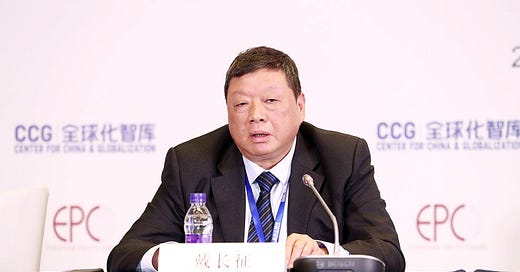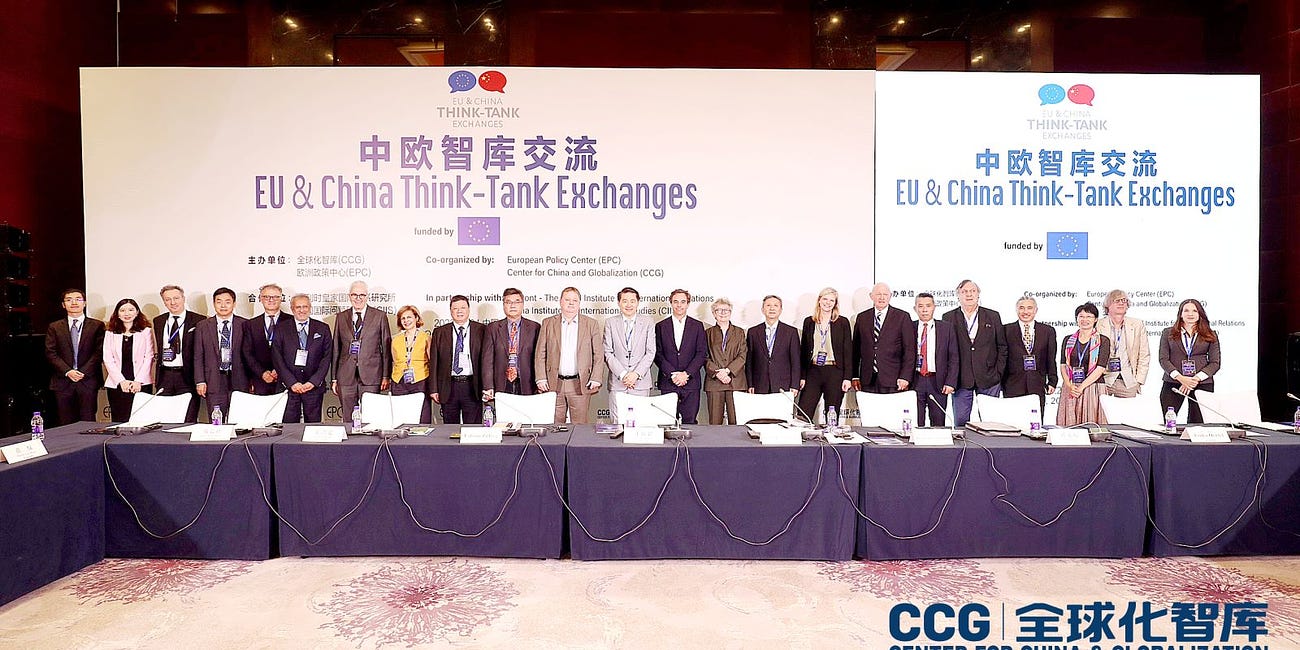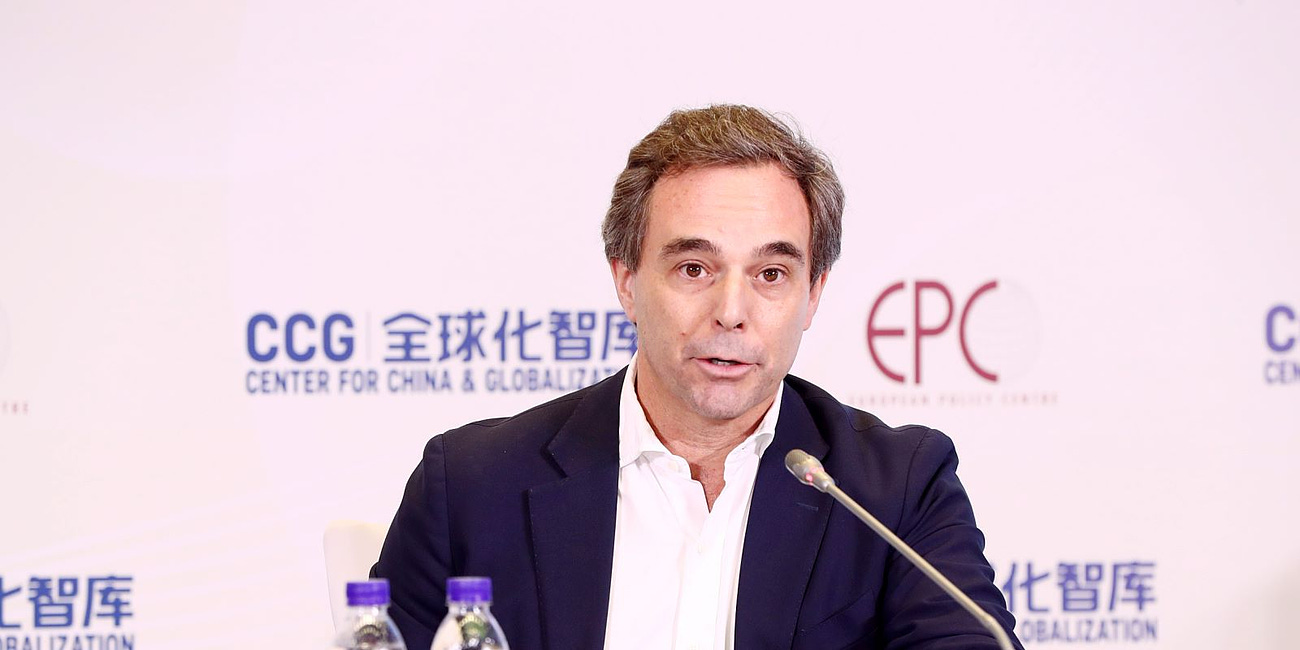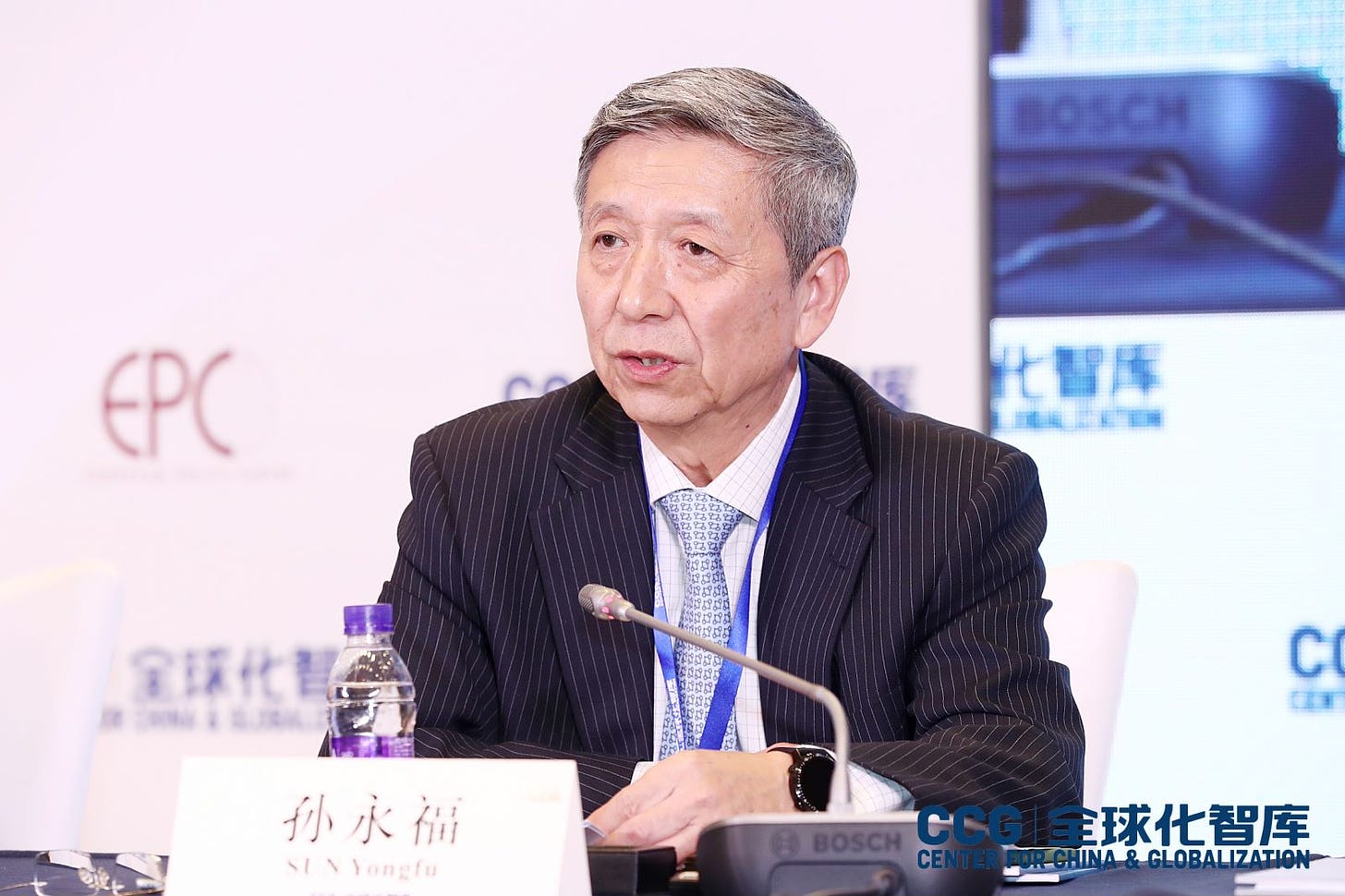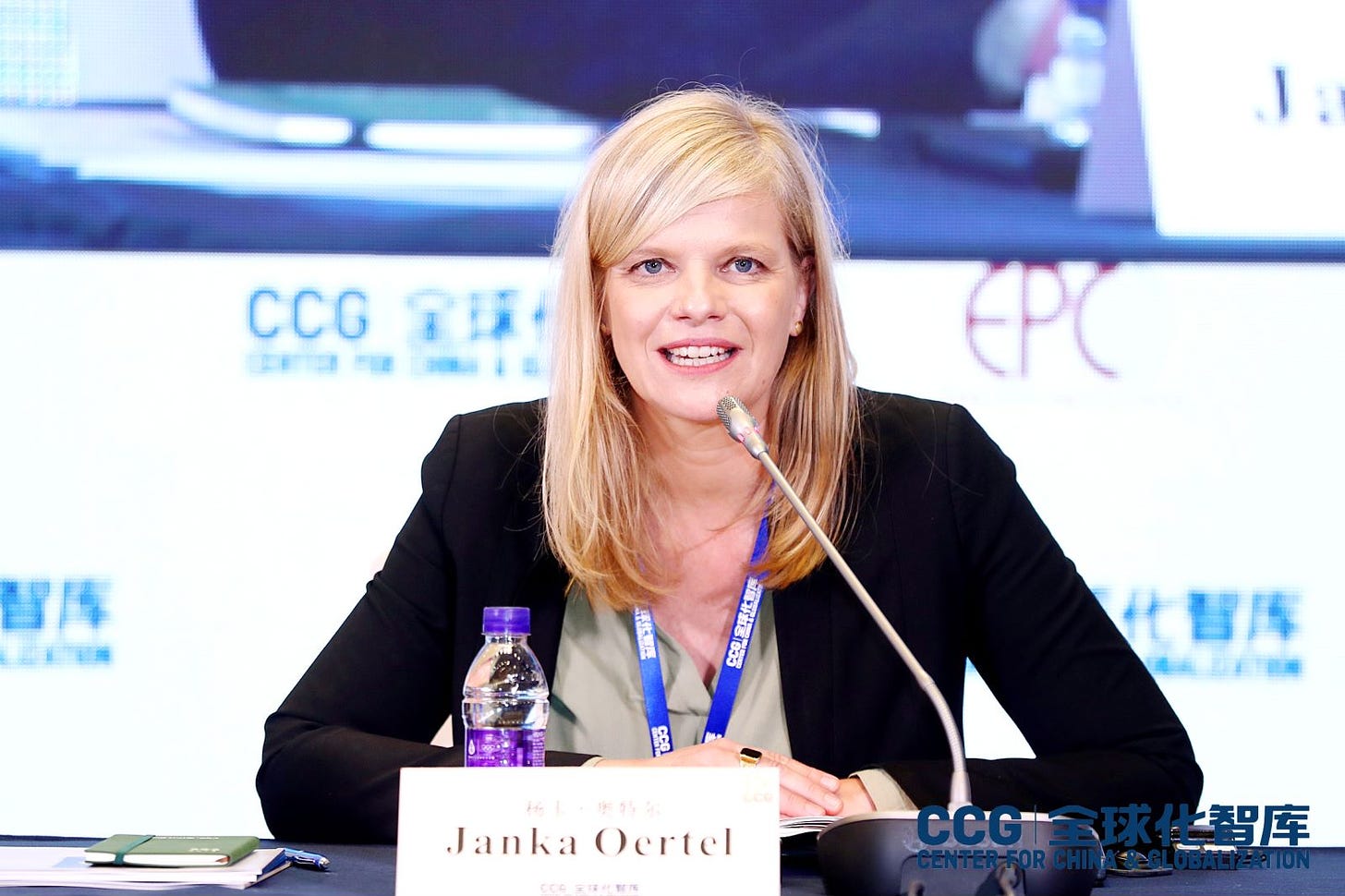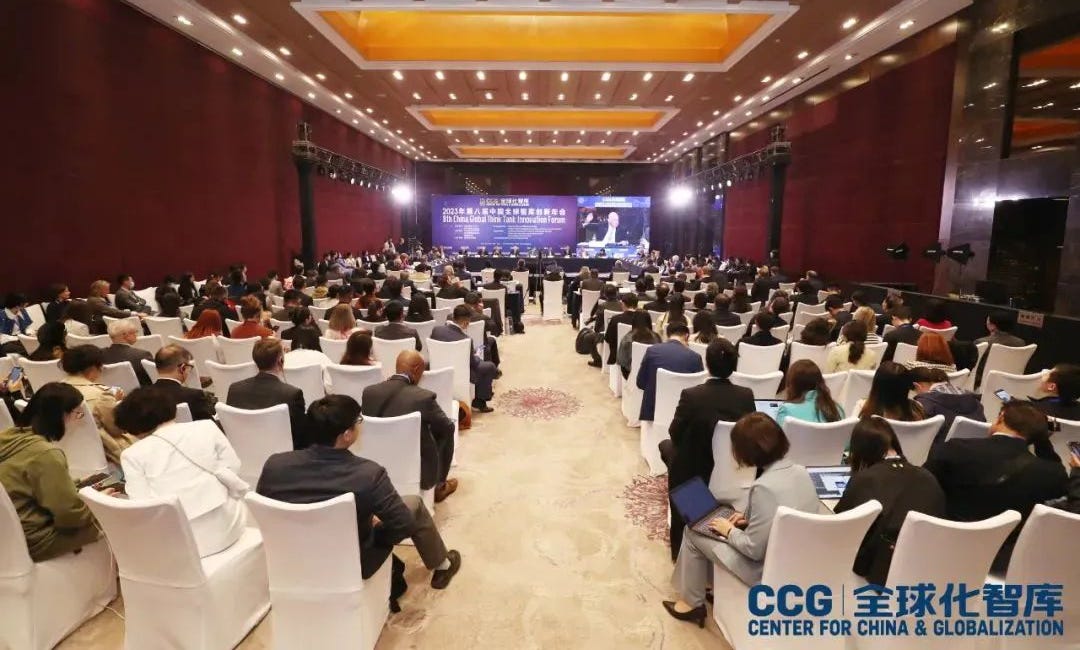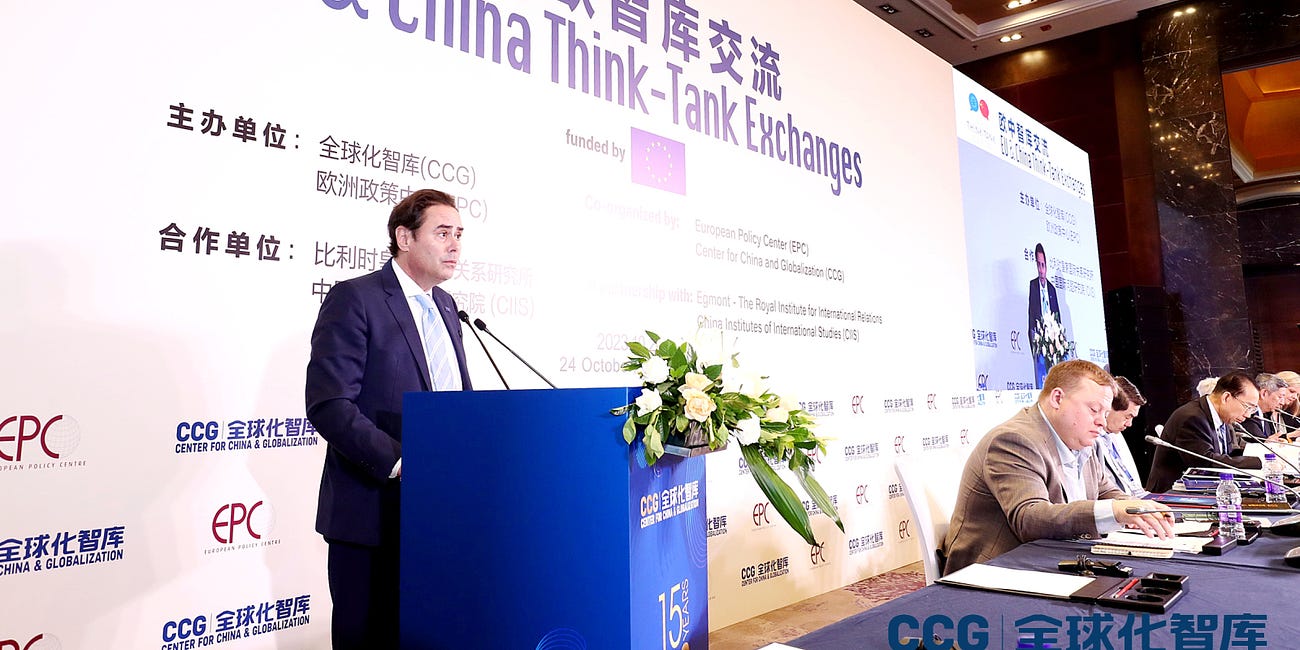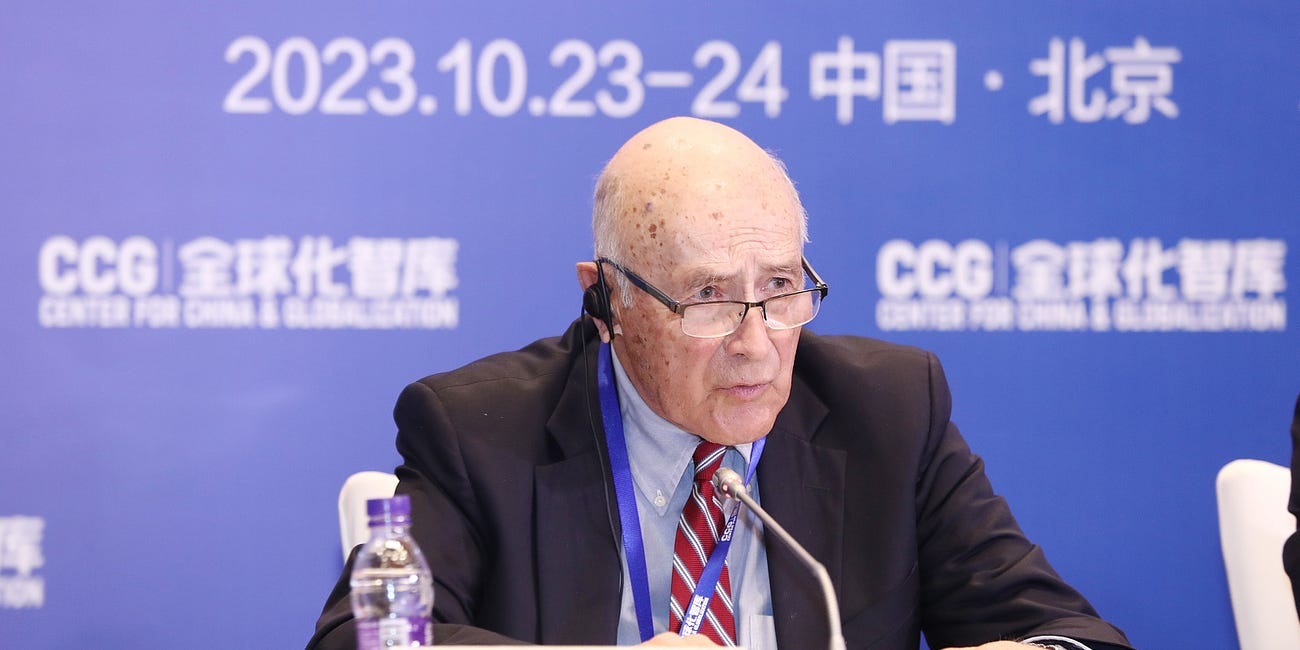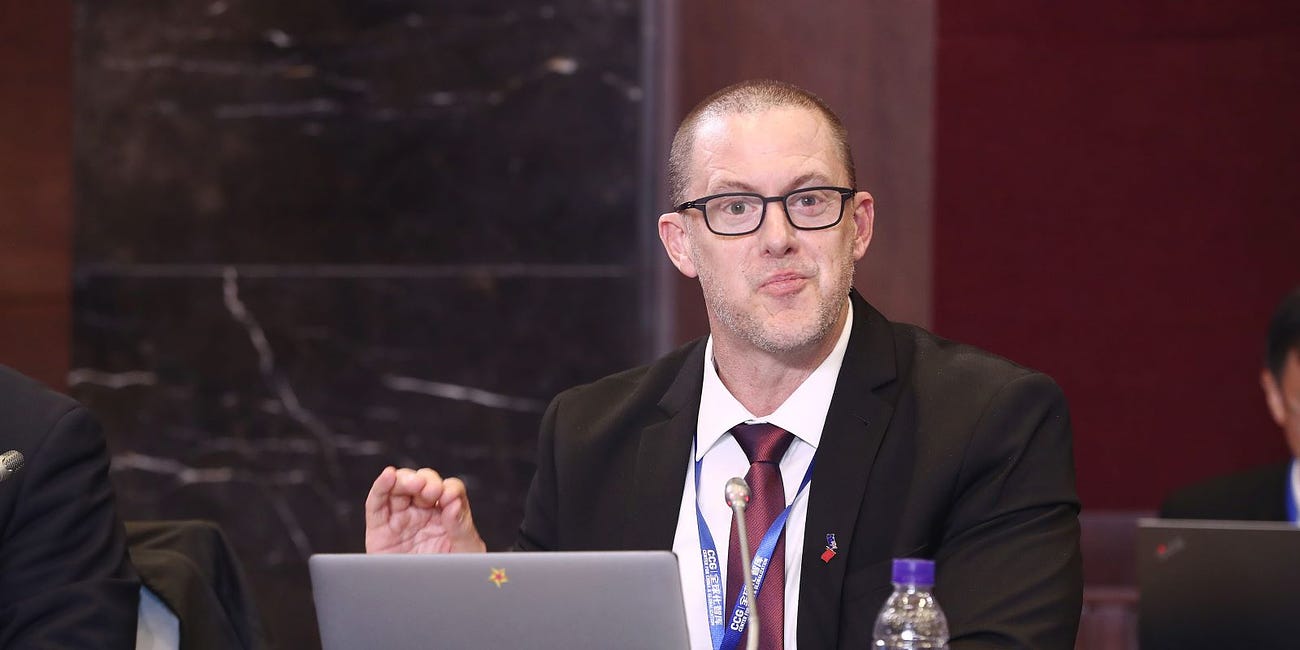Part Three of EU & China Think Tank Exchanges on Oct. 24, Beijing
Dai Changzheng, Francoise Nicolas, Sun Yongfu, Janka Oertel, Cui Hongjian, and Fabian Zuleeg responded to subsidies, strategic interdependence, Ukraine, and more.
The following is the transcript of roundtable speakers on "EU-China Relations: Review and Outlook" at the October 24, 2023, EU & China Think Tank Exchanges, co-organized by the European Policy Centre (EPC) and the Center for China and Globalization (CCG) and funded by the European Union, in Beijing.
This roundtable followed the opening speeches by Henry Huiyao Wang, founder and President of the CCG, Amb. Jorge Toledo Albiñana, EU Ambassador to China, and Amb. WU Hailong, President of China Public Diplomacy Association and former Chinese Assistant Foreign Minister and Ambassador to the EU.
Today's transcript covers six speakers who, after delivering their speeches and listening to the panelists' questions and comments, made the following responses and comments:
Dai Changzheng, CCG Senior Fellow and Dean of the School of International Relations at UIBE
Francoise Nicolas, Senior Research Fellow at the French Institute of International Relations and Head of the Center for Asian Studies
Sun Yongfu, Senior Fellow of CCG and former Director-General of the Europe Department of China’s Ministry of Commerce
Janka Oertel, Director of the Asia Program and Senior Policy Fellow at the European Council on Foreign Relations.
Cui Hongjian, Senior Fellow of CCG and Professor at the Institute for Advanced Regional and Global Governance of the Beijing Foreign Studies University.
Fabian Zuleeg, CEO and Chief Economist of the European Policy Centre
The video recording of this transcript is available on YouTube. It was also broadcast online by CCG and remains available in China.
This discussion was moderated by Ricardo Borges de Castro, Associate Director and Head of the Europe in the World Programme at the European Policy Centre.
Note that all transcripts are transcribed by CCG from the audio and video recordings and may contain errors. They haven’t been reviewed by the speakers.
Dai Changzheng, CCG Senior Fellow and Dean of the School of International Relations at UIBE
Yes, I agree some points of view of our speakers. First of all, I should say that, yes, we need dialogue, we need communication. We wish a positive, optimistic future of the China-Europe relations. However, we need, most importantly, to create chances, to have more practical ways to change such a situation. That is the most important.
From my point of view, there are some contradictory elements in the policies, and you see the European side has just raised another concept which is strategic autonomy. What does this mean? If it means that it should keep a strategic autonomy with both China and the UK, that is OK. If the strategic autonomy is just directed towards China, or has very different stances, different attitudes and practices towards the United and China, what will Chinese side think? So we should keep concepts, theories, policies, actually cohesive with our practice, with our policy. If our concept, our proclamation, our assertion, is not getting cohesive with our practices, then how do people think of your policy? That’s the logic.
Francoise Nicolas, Senior Research Fellow at the French Institute of International Relations and Head of the Center for Asian Studies
Thank you. So, very quick points. First of all, about the elections. Well, I would tend to challenge the idea that the right is gaining ground in Europe. You know, it's not all that obvious. So the recent election in Poland proved exactly the opposite. So, you know, elections are elections. The results are not known in advance. So we'll see what happens. You can never tell. So it's extremely complicated to anticipate what the results will be, and as a result, what the next Commission will will look like. I think it's extremely complicated to do such a thing.
Second, about strategic autonomy. I'm pretty comfortable trying to explain what it is, since originally it was a French concept. And I think it was a very unclear concept, which was interpreted in very different ways throughout Europe, even throughout France. As you will have noticed, perhaps, President Macron is now using less and less this strategic autonomy concept, and has shifted towards sovereignty. And I think it perhaps describes much better what he had in mind. Strategic autonomy was about the ability to define your own interests, your interests on your own, and not to simply align with the US. That was the point. So it's more about sovereignty than anything else, But it was, I guess, badly understood everywhere, and as well as in China , including China.
And this is really a problem with a number of concepts. Same thing is about derisking. Derisking is badly understood. Derisking is not about China. It is about reducing vulnerabilities associated with excessive dependence. So it happens that China is one of the economies on which the EU depends a lot for a number of products. But it's not about China specifically. It's really about limiting, reducing dependence. But I think it's badly understood.
And same thing is true for the holy trinity. I think Shada explained very well, that we can do many things at the same time, three things at the same time. And so there is absolutely no contradiction behind this holy trinity of systemic, rival, partner and competitor. But again, this is something that is badly understood. I guess we require a lot of pedagogy to explain exactly what we have in mind. And this is something sometimes very, very complicated.
Well, I leave the tricky question about nuclear to Janka, because I'm simply a modest economist, so, you know, nuclear stuff is not my stuff. And finally, well, thanks for the concrete proposals about what can be done between the EU and China on climate, climate finance, energy efficiency, secure economy, etc. With regards to data governance, I agree that this is a really big issue, and I agree that the discussion about norms and standards with regards to data governance is also of most importance. But as I said yesterday, but perhaps some of you did not attend the session yesterday, this is a tricky issue again, because the philosophers underlying data governance in various parts of the world are very different. And so there needs to be a discussion. But to get to the common ground will be, I guess, complicated. But let's let's discuss.
Sun Yongfu, Senior Fellow of CCG and former Director-General of the Europe Department of China’s Ministry of Commerce
Thank you very much. I think we have a very frank discussion. This is helpful to our bilateral relations, not only in the political arena, but also the economic and trade relations. I share the view of our German friends in saying that either China, or any country joining the UN agencies, they would like to cooperate, not to dispute.
To my understanding, and as our ambassador, Mr. Wu Hailong mentioned, the system difference is there for a long time, and we don't understand why now the EU put systemic rival at the first place. And from the Chinese point of view, we put the EU firstly as a partner, cooperative partner. So we try very much, together with our friends from the EU, where we can cooperate in different sectors, not only in the green economy, for example, but also the international challenges, some other fields as well. So we need to cooperate more and enlarge those sectors, as we discussed today, but not to heavily mentioned the so-called rivals.
We have never put the EU as our rival, so we don't understand why now, the EU put China in the systemic rival at the 1st place, and emphasize on that from time to time. So this is very difficult for us to understand. We try to cooperate. We try to way to find a way to enlarge our cooperation. But to close the differences between us, it's difficult. We put everything on the table, as we do it today, to discuss the differences. But to enlarge the field of corporation, I think that's a way to, to look forward as we discuss today the year of 2024 or even beyond. Thank you.
Janka Oertel, Director of the Asia Program and Senior Policy Fellow at the European Council on Foreign Relations
So maybe first on the question of Wang Yiwei on strategic interdependence and what the concept is supposed to mean, I think it will be in the category of Francoise, was of saying it is an attempt to describe the world that we see from a European perspective, a world in which countries do not want to be squeezed into a bipolar order and don't want to choose, and where the strength of certain middle powers could lie in banding together and creating flexible coalitions around issues specific areas. Whether this concept of strategic interdependence will take hold as a real concept? I'm very skeptical, let's put it like that.
On the question of Wang Caixiao, in terms of the question of the European Parliament, I do think it's really interesting to look into, just from a research perspective, what are far-right and far-left positions on China across Europe? Because there's no uniform answer to that. There are far right parties in Europe that are very pro-Chinese. There are far-right parties in Europe that are very skeptical of China. And I think it is a really good research area at the moment to look into, also from a European perspective, to do a little mapping of where do far-right and far-left parties stand when it comes to China because if the fringes are stronger in the European Parliament, this obviously does have an impact on policy formulation.
On the question of Jing Ling, I would say the need to derisk is the consensus. The how is not the consensus. Welcome to Europe on these questions. We can discuss, we will discuss for years. And obviously there's no consensus among the German business community, because the business community has various different interests. But the fact that the BDI paper is still being referred to, also by companies, also tells you that this is sort of the minimal consensus that they can still agree on because they could overturn it if they wanted to but they don't. So this is still the position where the companies feel comfortable having the business associations taking that role, and basically taking the hit also for a slightly harder position, and being able to kind of hide behind it as an individual company.
And Michael, I couldn't agree more that the security issues belong on the table in these conversations. I think this is the only point where, maybe I slightly disagree with with Francoise, that I think the fact that Europe does not see China as a kind of existential threat - I do think that that is moving, that this is changing because the situation Ukraine is bringing the security questions much closer home, and we are now having in the German China strategy, a real kind of passage on China as a security challenge. And I think that's something that is very new for the European conversation and emerging. And space conversations and nuclear conversations belong at the heart of that. That is absolutely true. This is a new version of EU-China relations I think, one we have to get used to.
Cui Hongjian, Senior Fellow of CCG and Professor at the Institute for Advanced Regional and Global Governance of the Beijing Foreign Studies University
Thank you. Time is tight, so I'm sorry that we could have, couldn't have time to expand our discussion. But I need to try to share some three points, as I heard so much my colleagues here.
Firstly, they got into the so-called trade balance issue, especially from Mme Nicolas Francoise. Francoise is a very, very close friends of mine, and also a respected economist. So I believe that you do have a very professional analysis about this difficulty issue now between China and European Union on trade imbalance. But I also would like to say that behind all of this explanation or analysis from the European Union side on this anti-subsidy investigation, some other trade investigations between China and European Union, I also would like to mention the big ambition from the European Union institution to try to show off its own authority as one of the dominating policy making institution, and try to practice any kind of, even over-regulation, against China.
Another question that has not been mentioned is, as we know, the European Union side tries to look for a more comfortable position between this gaming between China, US, and the European Union. Also, because there are still trade settlers between the European Union and the United States, but at the same time, the European Union is suffering from this subsidy competition from Washington. So I think between China and the United States, certainly to choose China as a target of this anti-subsidy investigation will be more comfortable or more favorable for the European Union.
But according to my long-term observation, no matter what happened between Washington and Brussels, no matter how close cooperation, coordination between the European Union and the United States, I think still, constructive competition, not only in green economy, in subsidies, but also in some others sectors will give more risks for the European Union to, for example, try to insist its green economy industry policy.
Secondly, how about this Ukrainian issue? I don't want to say something more, because it looks like China always is defending itself. It looks like China did something wrong once it insists its current position or attitude. I just want to say, maybe from the Chinese perspective, once China agrees with any kind of requirement from European Union side, especially to share some moral stance with European Union on Russia, certainly there will be more requirements from the European Union side. For example, the European Union side will require China to join into the sanctions against Moscow. And also the European Union side will require China, maybe, to do something similar with the European Union, to drop down, or to reduce its economic and trade relations with Russia. All of these requirements, I don't think is in the interest of China.
I think another very big concern from China is, when something did in that way, when something done in that way, what's the benefit for China to get some more corporation from the European Union, or even from the United States? Now, I think it's just a very, very big dilemma from this requirement from the European Union on China is: please join me to have some more condemns of criticisms, even sanctions against Moscow; but of course, at the same time, you need to do something to have some more influence on Moscow. So I think it's a conflicting requirement from the European Union, because once China takes the side of the European Union on this Ukrainian crisis, I don't think there will be more space for China to impose influence on Moscow.
And also, finally, yes, now we are talking about any kind of possibility for China-EU relations, especially in the next year. Why? Because next year, there will be some political change happening not only in Washington and in Brussels, or maybe in some other capitals of European countries. I think that no matter what happened, the European Union side just take the approach to deal with all of its crises and to try to reach resilience. Just like President Von de Leyen mentioned, the European Union needs to go back to the future. Of course, going back to the future means there will be, maybe, a big cycle, or a big race we need to cover, or we need to reach. Unfortunately, the China-EU relations will be part of this approach of going back to the future from the European Union. But I think we are still confident about this future when we will be more patient, when we will have some more resilience. But of course, I think now the very big risk for the European Union side is going back to the future. The future would be the destination. But perhaps, once European Union, or some other players make some big mistakes, perhaps we'll just go back to the past, not in the future. Thank you.
Dr. Fabian Zuleeg, CEO and Chief Economist of the European Policy Centre
Thank you very much. I'm the last person standing between you and lunch, so I'll try to be very quick. So I'll make very short points, but very happy to also continue that discussion over lunch.
First point I want to make, that Henry mentioned the condemnation of nuclear war, and I think it's important to say that this is extremely welcome, and I think it is something which needs to continue to happen, that it has to be clear that this cannot be an option in the war or Russia against Ukraine.
Second point, it is difficult to cooperate on climate change because it's intricately linked to industrial policy, to trade, to all of the issues. I mean, this is exactly what we had with electrical vehicles. Is it a climate change issue? Is it a trade issue? And I think that points towards actually more global conversations. We need to have an agreement on what constitutes relevant and effective action to promote climate change, and what is protectionism in that context.
Third point, I think sometimes the strong reactions to what happens in Europe by China, can make the situation worse. The Comprehensive Agreement on Investment was mentioned. I cannot see a future for the Comprehensive Agreement on Investment as long as there are sanctions on members of the European Parliament. So these kind of reactions and counter-reactions in the relationship.
Fourth point, on the new political cycle, I think, yes, there might be change, but the same pressures and challenges remain. And while there is a diversity of opinions in Europe, I would actually argue that there is a fairly broad consensus on some of the key questions, on some of the key priorities. And sometimes I worry that some of the voices you hear in China are not very representative of that consensus. And I think that's why it's important to have these exchanges.
And my final point, this is a bit of a personal point as well: please feel free to criticize the EU, criticize what we are saying. But when I say something that my Chinese colleagues don't like, then please don't portray us as somehow coerced by the US. The EU has its own opinion. I have my own opinions. We do not speak for the US. We have a lot of disagreements also with the US. So please engage with us on any EU perspective. Thank you. (Enditem)
Again, this transcript is transcribed by CCG from the audio and video recordings and may contain errors. It hasn’t been reviewed by the speakers.

